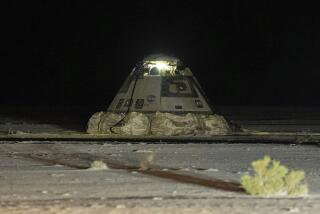Shuttle launch delayed until at least Jan. 2
Plagued by troublesome fuel sensors in the space shuttle’s main propellant tanks, NASA officials Sunday decided to postpone the launch of Atlantis until Jan. 2 at the earliest.
For the second time in two launch attempts last week, at least one of the four engine cutoff sensors failed when technicians were fueling the craft on its launch pad. Two sensors failed during fueling Thursday, and a third failed while the tank was being emptied.
The purpose of the sensors is to shut off the shuttle’s main engines when fuel levels in the tank get below a specified level, either because all fuel has been used up or the tank has been emptied by a leak.
Shutting off the engines in such a situation is crucial because continuing to run them as fuel runs out could cause the fuel pumps to break, potentially leading to a catastrophic explosion.
The sensor problem has periodically bedeviled NASA since flights resumed after the 2003 Columbia tragedy. A September 2006 launch of Atlantis was delayed because of sensor problems, as was a July 2005 launch of Discovery.
Working Friday and Saturday, engineers thought the problems might be traced to a subtle manufacturing problem in the sensors. They had hoped that replacing all four sensors with new ones might overcome the difficulties.
That was not to be. Fueling was halted Sunday morning.
Because of sun angles and other orbital considerations, Atlantis would have to be launched by Thursday to meet up with the orbiting International Space Station.
Rather than try to meet that deadline, officials decided to delay the launch and investigate the sensors more thoroughly.
“We’re determined to get to the bottom of this,” said LeRoy Cain, chairman of the mission management team.
Launching on Jan. 2 “is going to depend on what we find out,” he said.
Most of the inspections and many potential repairs can be carried out on the launch pad. But more invasive repairs would require moving the shuttle back into the massive Vehicle Assembly Building, which would delay the launch for several more weeks.
Atlantis is scheduled to carry the European Space Agency’s $2-billion Columbus laboratory to the space station. The agency has been waiting for years to get the lab into orbit.
“We’re disappointed that we are not flying,” said Alan Thirkettle, the ESA’s station program manager. “We’d love to fly, but we want to fly safe.”
More to Read
Sign up for Essential California
The most important California stories and recommendations in your inbox every morning.
You may occasionally receive promotional content from the Los Angeles Times.










